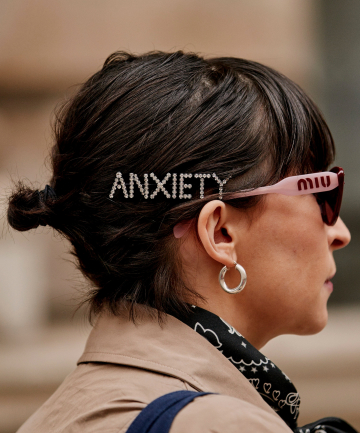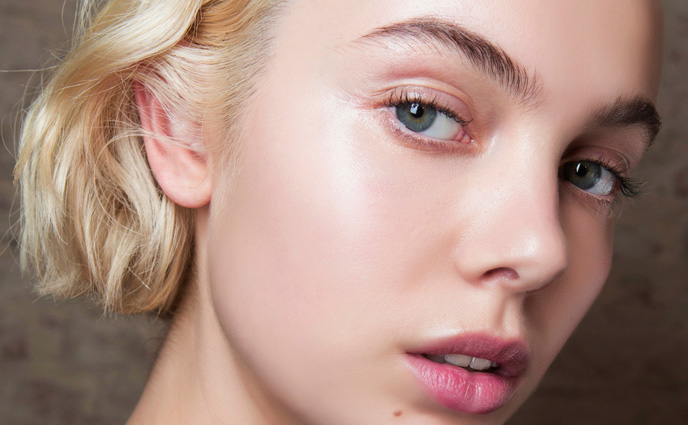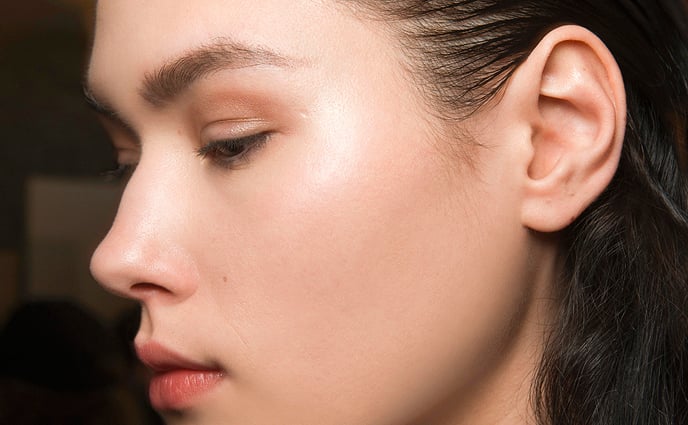But what they do know is that any perceived trauma to the body can cause hair to fall into telogen effluvium. "It can be physiologic or emotional stress, and it may not be due to a bad thing," says Dr. Gohara. "It could be something joyful, like a wedding, giving birth, or moving somewhere. Pregnancy can also be a physiologic stress on your body." But, as she explains, illness and negative life stress like divorce or loss of a job also kick it into gear. "It can be anything that poses some type of physiologic or emotional stress on you, from general anesthesia to having a really bad flu, stress related to COVID, or just the stress of living right now."
Image via Imaxtree
Image via Imaxtree
Here's the kicker: it takes time to grow hair, right? Which also means the resulting telogen effluvium you're experiencing is probably from something that happened three-to-nine months ago. "When you're pregnant, you've got great hair," explains Dr. Engleman. "Once we give birth, it can be three-to-nine months postpartum that hair starts to shed. "It's why patients with a nine-month-old child can't figure out why their hair is falling out. "It's a snapshot of what happened in the past." Which means a stressful event in the past could be causing the hair loss you have now.
Also, the amount shed is profound by the time you notice it. "The reality is, people often have to lose about 50 percent of their hair volume before they detect they're losing hair, which is a lot to lose," Dr. Engleman warns. "Patients often notice their ponytail isn't as thick; they're perceiving a significant reduction, which is real: a patient has to lose a lot (of hair) before they notice they've lost it."
But you aren't alone: both our dermatologists have seen a massive uptick in stress-related hair loss cases this year. "I've had more tears shed in my office over hair loss than even skin cancer because it really is so emotional for people," says Dr. Engleman, whose patients bring in bags of lost hair or photos depicting shower drains filled with it. "It's so psychologically stressful."
Dr. Gohara agrees the uptick in telogen effluvium patients is across the board "People are scared out of their minds," she observes, noting people will come in afraid to take showers and/or wash their hair for fear of their part getting wider.
Image via Luka Svetic/EyeEm/Getty
Also, the amount shed is profound by the time you notice it. "The reality is, people often have to lose about 50 percent of their hair volume before they detect they're losing hair, which is a lot to lose," Dr. Engleman warns. "Patients often notice their ponytail isn't as thick; they're perceiving a significant reduction, which is real: a patient has to lose a lot (of hair) before they notice they've lost it."
But you aren't alone: both our dermatologists have seen a massive uptick in stress-related hair loss cases this year. "I've had more tears shed in my office over hair loss than even skin cancer because it really is so emotional for people," says Dr. Engleman, whose patients bring in bags of lost hair or photos depicting shower drains filled with it. "It's so psychologically stressful."
Dr. Gohara agrees the uptick in telogen effluvium patients is across the board "People are scared out of their minds," she observes, noting people will come in afraid to take showers and/or wash their hair for fear of their part getting wider.
Image via Luka Svetic/EyeEm/Getty
Yes, your stress-related telogen effluvium will pass, but be aware hair loss could also be due to autoimmune triggers, genetic disposition, or other malfunctions of the body. This means it pays to have an official diagnosis from a dermatologist who can run tests and diagnose you accordingly. This isn't something you should self-diagnose: while telogen effluvium isn't a serious medical problem, other conditions which cause hair loss could be.
Image via SDI Productions/Getty
Image via SDI Productions/Getty
Know stress-related hair loss, while disconcerting, isn't permanent. "First, we have to educate the patient," says Dr. Engleman. "You're going to stop the falling out and then you'll see new growth, but it takes a while. It's not fun because patients want an immediate result." Again, anyone who's ever tried to grow their hair out knows there's a waiting game. Dr. Engleman advises managing expectations appropriately: first, stop the shedding, then focus on regrowth. But time takes time, so be patient.
Image via Hanna Hildsberg/EyeEm/Getty
Image via Hanna Hildsberg/EyeEm/Getty
It's critical to lower stress since that's how it starts. It might seem cruel to tell you to relax when your hair is falling out, but it's crucial to stop the excessive hair shedding. Both dermatologists advise anything you can do to chill: meditation, yoga, exercise, deep breathing.
Also, go to sleep: "Lack of sleep can really affect your stress levels and increase your cortisol levels, so sleeping adequately is something you should aim for," advises Dr. Gohara. "But the real treatment is just time. We're animals and we shed just like any other animal. Sometimes shedding is just excessive, but with time that'll recalibrate itself."
Image via Westend61/Getty
Also, go to sleep: "Lack of sleep can really affect your stress levels and increase your cortisol levels, so sleeping adequately is something you should aim for," advises Dr. Gohara. "But the real treatment is just time. We're animals and we shed just like any other animal. Sometimes shedding is just excessive, but with time that'll recalibrate itself."
Image via Westend61/Getty









